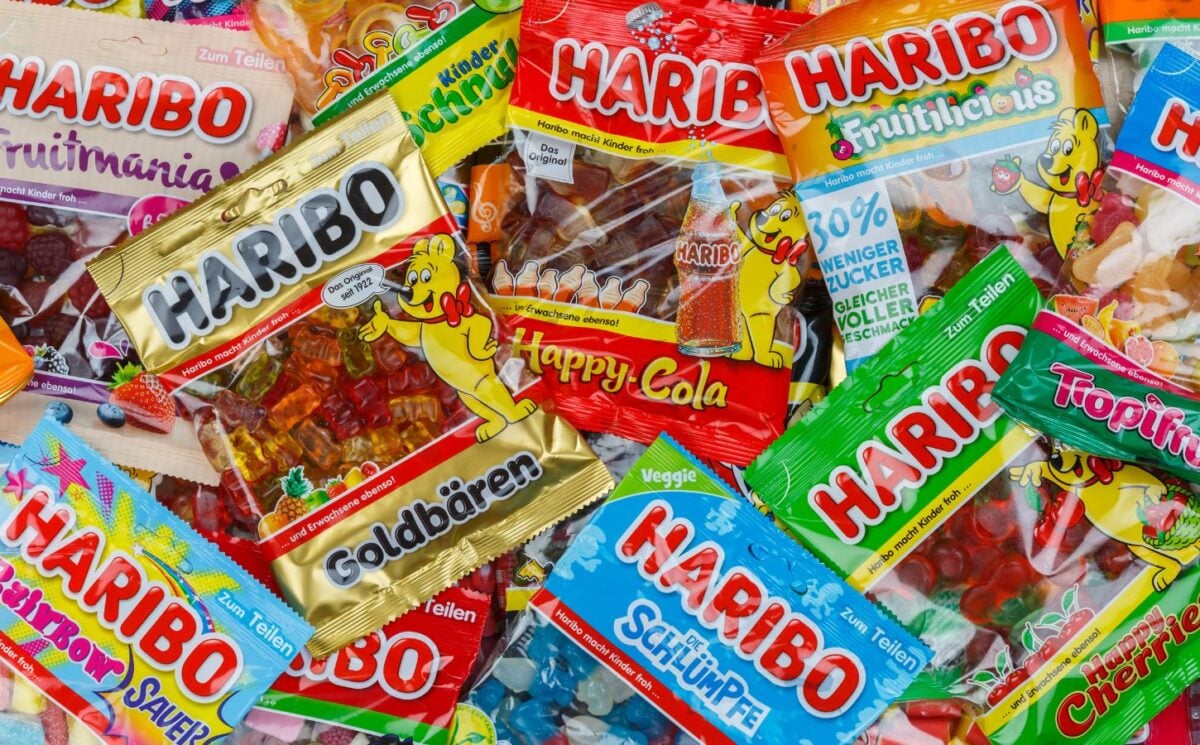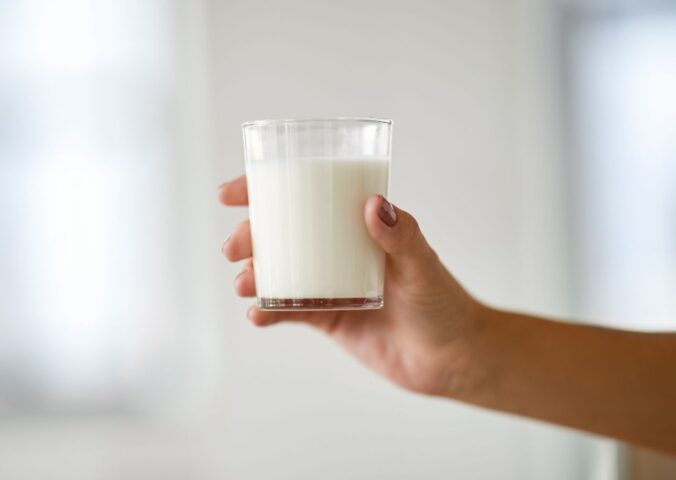Haribo is the most popular sweet brand in the UK and one of the top 10 largest worldwide. But are Haribos suitable for vegans? And if not, why not?
Habibo is a German company that’s perhaps best known for its iconic Golden Bear, of which it produces 160 million every single day. In addition, Haribo’s full range has up to a thousand different gummy sweets, including other fan favorites like Tangfastics, Starmix, and Jelly Beans.
Founded in Friesdorf, near the western German city of Bonn, Haribo is a family business now in its 104th year of operations. The scale of Haribo’s sweet production has come a long way since founder Hans Riegel first began making in his home kitchen back in 1920, and today the company even tailors recipes to suit the unique flavors of the hundreds of different countries and regions in which it operates.
As global demand for plant-based foods grows across the sector, confectionery is no exception. In a recent report, it was predicted that the Vegan Confectionery Market – which has already shown rapid growth over the past few years – could reach USD $2.9 billion by 2030.
Key drivers of this demand include health, ethical, and environmental concerns, and a further increase in vegans and plant-forward consumers overall. The report notably adds that “swift expansion” is expected in the vegan jellies and gummies market, in particular, with “nostalgia and texture replication” playing key roles in driving sales.
With this growing demand for iconic, nostalgic, and plant-based gummy sweets in mind, are Haribo candies vegan? And which ones are vegan-friendly? Here’s everything you need to know.
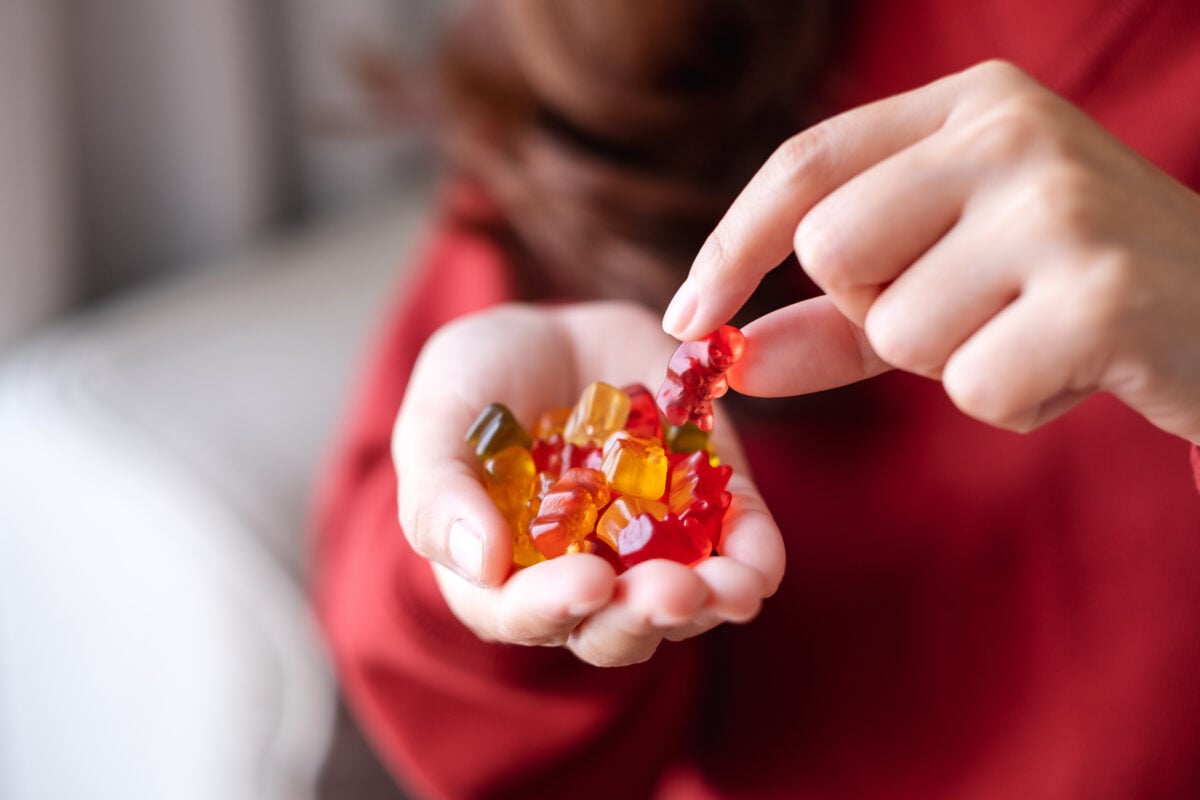
Is Haribo vegan?
The short answer is, that almost all of Haribo’s many sweets are unsuitable for vegans.
The most well-known non-vegan (and non-vegetarian) ingredient in Haribo is gelatin, which is obtained by boiling the body parts of animals – notably cows, pigs, and fishes* – in water. According to Haribo’s website, the entire standard UK range contains gelatin derived from pork, including the brand’s MAOAM and Chamallow products.
Gelatin is a commonplace animal ingredient throughout the confectionery industry, though a 2023 survey revealed that 67 percent of Brits were unaware which everyday products contain it. They also were largely unaware of where it comes from and expressed shock at the bloody way it is manufactured.
Jamie Laing, co-founder of Candy Kittens – the all-vegan sweet company that commissioned the survey – previously told Plant Based News (PBN) that they suspected this might be the case before conducting the study.
“This research has confirmed our suspicions that shoppers aren’t being made aware of what their favorite sweets truly contain,” said Laing. “Especially when it comes to gelatin.”
Nine out of 10 respondents to the survey said there should be more transparency with labeling gelatin, with a third of respondents saying they would be prepared to boycott their favorite snack – or to find an alternative brand – if they knew it contained gelatin.
“We are calling on the industry to be more transparent about their ingredients so that consumers can make informed decisions,” added Laing.
Other non-vegan ingredients
Gelatin isn’t the only non-vegan ingredient in Haribo. A significant number of products also contain shellac (food additive code E904) and beeswax (E901), both of which are commonly used glazing and sealing agents across the confectionery industry. (They are frequently used to give candies such as jelly beans their distinctive shine.)
Shellac is derived from the secretions of lac bugs, who die in their hundreds of thousands during processing to produce just a single pound of shellac. Meanwhile, harvesting beeswax disrupts the hive and frequently results in so-called accidental bee deaths.
Flexitarians and plant-forward consumers may not take issue with secondary animal-derived ingredients such as beeswax, but sweets that contain them are unsuitable for vegans, who by definition avoid products that cause animal exploitation wherever possible.
Carmine (E120) is a natural red food dye also frequently used in confectionery and other products. Carmine is made by grinding up the bodies of red-scaled cochineal insects and is cheaper than plant-based alternatives, making it a popular choice for manufacturers.
Two additional ingredients to take note of are sugar and palm oil, both of which are used in certain Haribo sweets as well as across the confectionary sector.
In the UK, the three main sugar producers’ products are suitable for vegans, but in the US some companies use bone char for processing sugar. (However, it’s worth noting that bone char produced sugar is often deemed acceptable for vegans, as it would be very difficult to avoid entirely. More on whether sugar is suitable for vegans here).
Meanwhile, palm oil, a near-ubiquitous ingredient in everything from confectionery to beauty products, is linked to deforestation and other habitat destruction, particularly in the biodiverse islands of Malaysia and Indonesia. While palm oil is vegan, many vegans choose to avoid it.
Vegan alternatives to animal ingredients in confectionery
While many of the ingredients listed above are common throughout confectionery production and the food sector in general, there are several alternative ingredients on the market.
For example, producers can easily replace glazing agents like shellac and beeswax with plant-based ingredients such as corn protein – achieving comparably glossy results as well as the same protective layer that shellac provides when applied to sweets and produce.
A study by Ana Lúcia Fadini, published in the journal Food Hydrocolloids in 2013 found that hydrolyzed collagen film and cocoa butter could also be used to create effective shellac-free film coatings for various food products, minus the animal ingredients.
Meanwhile, carnauba wax, produced from the leaves of the carnauba palm, is already widely used in candies, licorice, Tic Tacs, and chewing gum with the same desirable results as beeswax – protection from decomposition and an aesthetically pleasing shine.
There are also readily available vegan alternatives to carmine in the form of natural plant-based dyes and colorings made from cabbages, beetroots, strawberries, and other produce. These are also already in use by candy companies, but some – such as Haribo – most likely eschew the plant-derived versions because carmine is cheaper to produce.
‘Most of the sweets industry is full of gelatin’
There are even a number of plant-based alternatives to animal-derived gelatin, including vegetable gelatin, agar agar, cornstarch, pectin, xanthan gum, guar gum, and carrageenan. All are widely available and widely used in both home cooking and large-scale production.
Gelatin is linked to factory farming and other ethically and environmentally dubious practices, but production is also a USD $6 billion industry in its own right. In fact, according to the Humane League, upwards of 300,000 tons of gelatin are produced per year.
“Most of the sweets industry is full of gelatin – it’s hidden within sweets masked behind bright colors and playful cartoons and vague on-pack ingredients. But it’s simply not needed,” Laing previously told PBN. “We’ve proved that it’s possible to make sweets that do not compromise on taste and are made with a plant-powered recipe that does not harm animals.”
Are any Haribo products OK for vegans?
Just a select few Haribo products are suitable for vegans, though with the predicted growth of the plant-based confectionery industry that might change in the coming years. In general, Haribo sweets that are gelatin-free and coated in sugar – meaning no glazing agent – are likely vegan-friendly too. But always, always check the ingredients first.
Please note: recipes may differ depending on where you are in the world. This list contains products that appear to be vegan, but are not labeled as so. Please reach out to the manufacturer if you are concerned.
Haribo Rainbow Strips
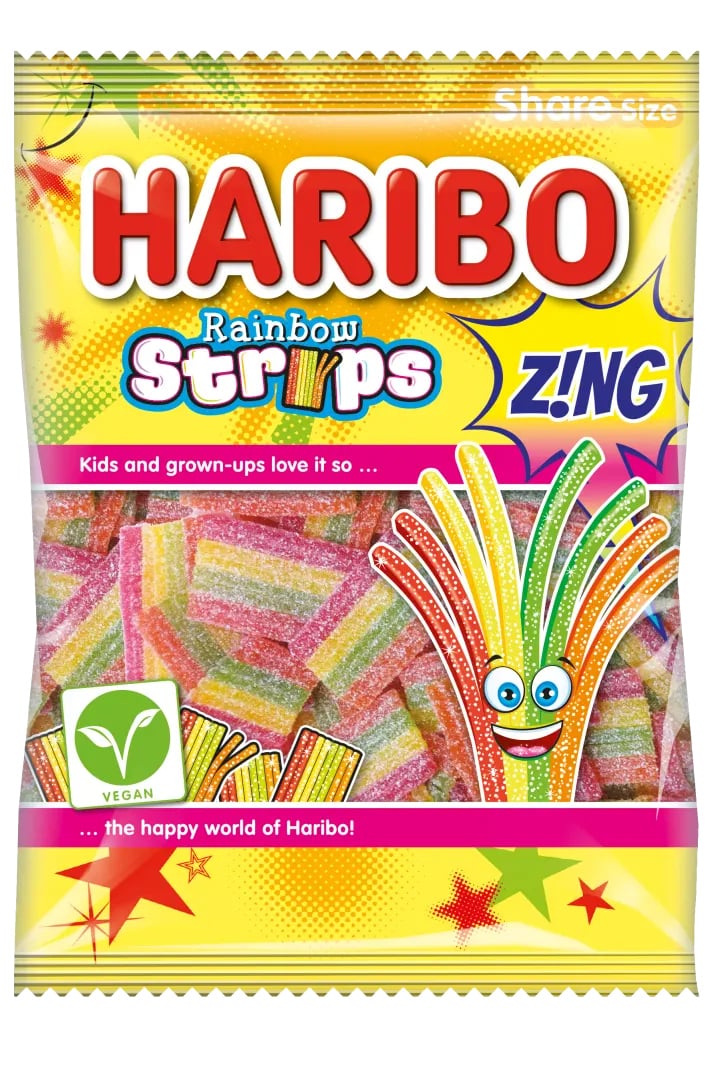
Rainbow Strips are one of the two varieties of vegan sweets currently listed on Haribo’s official UK website. The company says: “HARIBO Rainbow Strips Z!NG are fruity strips of tasty flavors coated in sweetly sour z!ngyness. They’re Vegan too!”
Haribo Sour Rainbow Twists
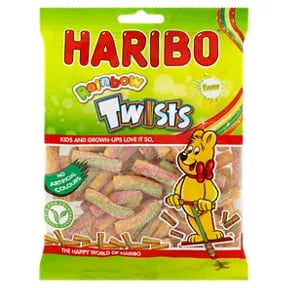
Haribo’s Sour Rainbow Twists are labeled as suitable for vegetarians but are currently prepared to a vegan recipe without gelatin and beeswax. The sour, sugar-coated sweets are flavored with blackcurrant, elderberry, grape, and sharp-tasting aronia.
Haribo Jelly Beans
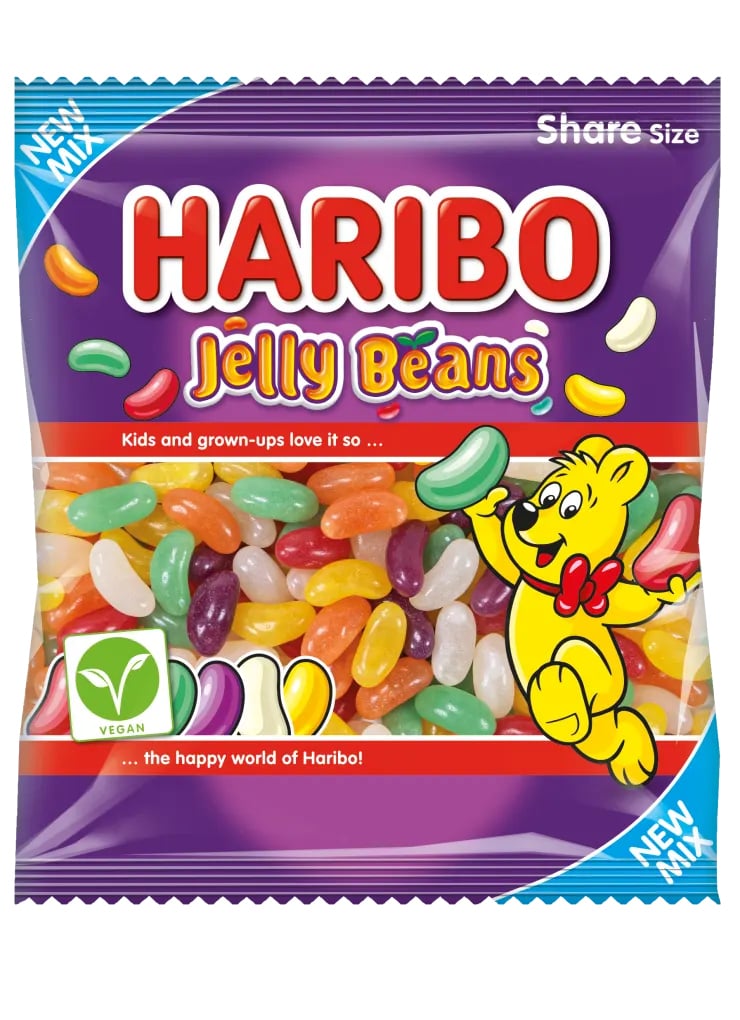
While Haribo’s standard jelly beans are not suitable for vegans, these ones – also listed on the company’s site – are clearly labeled vegan and contain no animal-derived ingredients at all. The six flavors are raspberry, blackcurrant, orange, lemon, peach, and pineapple.
Haribo’s Soft Jelly Bear
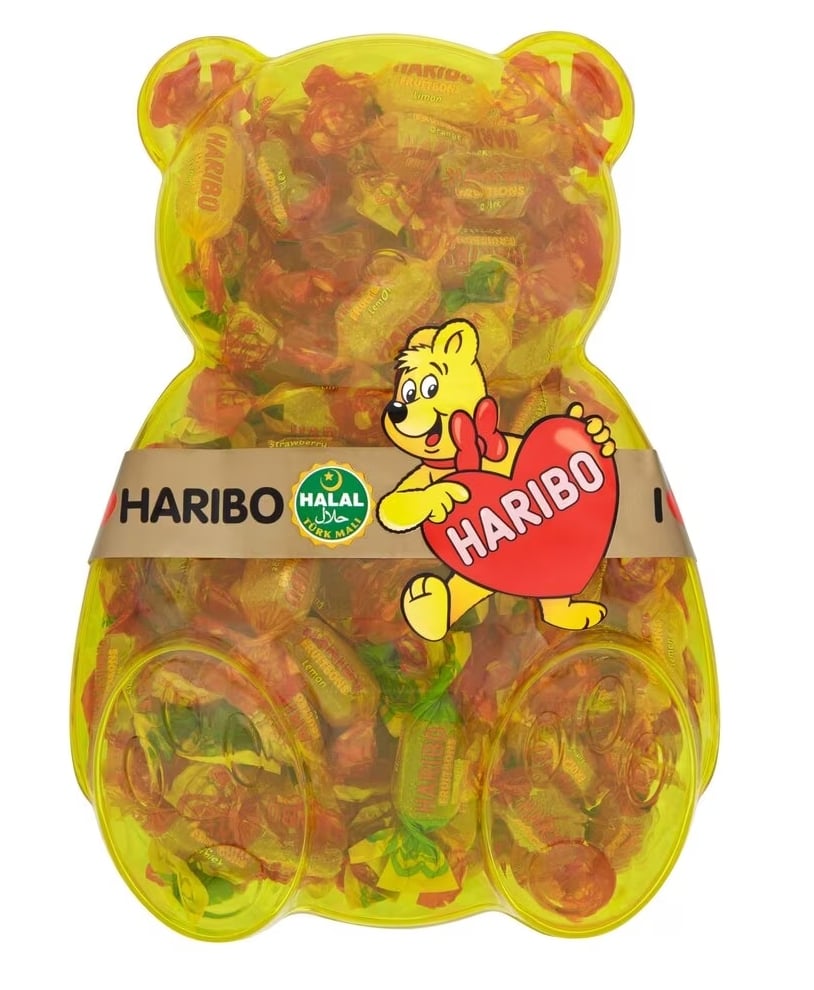
This giant jar contains 1kg of vegan soft jelly sweets and is widely available from Tesco, both online and in stores. The recipe is Halal and 100 percent free from pork or beef gelatin. The sweets appear to be vegan, and are made with concentrated fruit juice from carrots and radishes along with oranges, lemons, apples, and strawberries.
*While the English language typically refers to multiple fishes as “fish,” we use “fishes” to emphasize their individuality
